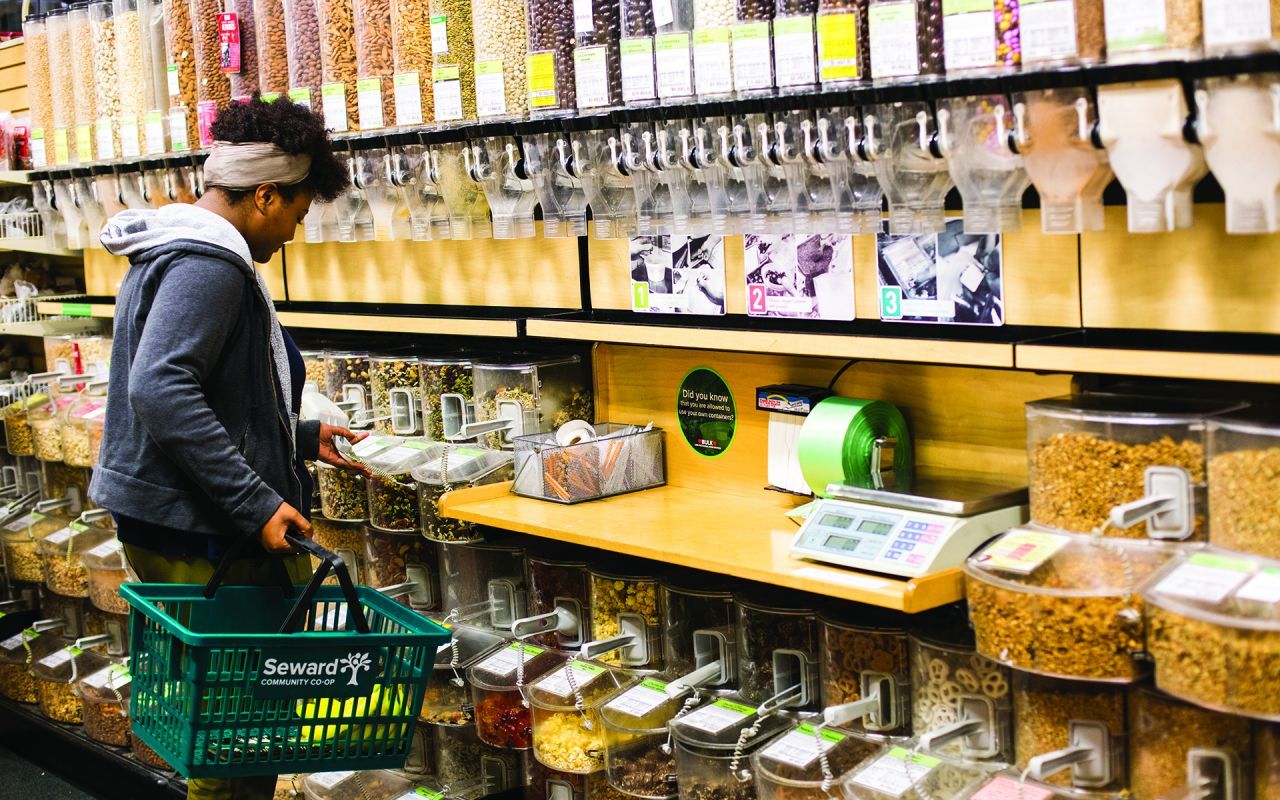 As co-op shoppers, we are presented with a multitude of choices in the grocery store—we have choices around fresh or frozen, we have dietary choices, sourcing choices and choices around ready-made or raw ingredients.
As co-op shoppers, we are presented with a multitude of choices in the grocery store—we have choices around fresh or frozen, we have dietary choices, sourcing choices and choices around ready-made or raw ingredients.
What I learned participating in Hennepin County’s Zero Waste Challenge is that as we choose which products are best for our households, we also choose the packaging our food comes in. Rice, for example, can be purchased in a cardboard box, plastic bag, in bulk, or even cooked at the deli counter.
If you find yourself wrestling with how to cut down your household waste, here are a few things to consider as you shop grocery aisles that are full of choices.
Remember containers—Consider keeping a stock of reusable bags and containers in several places to never miss the opportunity. Keep some by the back door, in the car or in your desk at work. It’s harder to forget them when they are everywhere! And remember, “reusable bag” does not mean you have to buy something new to serve this purpose sometimes “reusable” is last week’s plastic bag, rinsed, dried and used again for today.
Stick to your list—Shop your cupboards first and then make a shopping list. Sticking to it minimizes impulse purchases or overbuying and cuts down the likelihood of wasted food. There are some great shopping list apps, like Google Keep, that allow you to collaborate with other household members as well!
Shop bulk aisles first—Seward Community Co-op offers bulk oils, nuts, clays, spices, beans, household cleaners, teas, dried fruit, shampoo, grains, pasta and baking ingredients galore! Did you know you can buy laundry detergent in bulk? You can use your own containers for all of these items, and if you do need a bag, take a look at your options first. In addition to plastic bags, our staff stocks paper bags for dry ingredients and hard plastic tubs for wet ingredients that can be reused or recycled through residential collection. Shopping in bulk also allows you to buy recipe ingredients in exact amounts. Trying something new with unfamiliar ingredients? Bulk offers a great way to test a small amount before committing to a large container’s worth and reduces the potential of wasted excess ingredients.
Ask yourself:
- How many different ways can I buy this product?
- Is there a waste-free option?
- Or is there an option that uses recyclable packaging?
Produce strategy—Resist the temptation of using a plastic produce bag. That melon will be OK loose
in the cart. If you forget your reusable bag and need something to put a pound of cherries in, think of all
those container options we stock in the bulk section and choose the best material for the job.
Consider packaging material—Glass, paper and aluminum are easily recycled curbside. Plastics are tricky. Some plastics are not recyclable (chip bags
or vacuum seal) and others require special handling (plastic bags). When able, opt for packaging that can be recycled or reused. Glass tomato sauce jars make excellent food storage containers, for example!
Check the math—Buying products in the largest possible container not only reduces waste, but often it also saves you money. The price per unit can
drop as volume goes up. Run the numbers on your favorite yogurt for the different sized options. The cost savings may surprise you.
While there are a lot of different ways to reduce waste, take comfort in knowing there is no “right way” to go about it and we don’t have to be perfect each and every time we shop. Picking and choosing the efforts that make the most sense in our lives and performing them some or most of the time can all add up to significant environmental impact.
Watch our fall class schedule for a Low-Waste Grocery Shopping class. Check out Hennepin County’s Zero-Waste Challenge program: www.hennepin.us/zerowastechallenge.
For tips to reduce food waste, visit www.savethefood.com.
Taking part in #PlasticFreeJuly? Visit www.plasticfreejuly.org for more information and tips.
Mary Phelps is a Hennepin County Master Recycler/Composter. This article appeared on pages 9-10 of the Sprout! Summer 2018 issue.
Seward Community Co-op has several open positions, including entry-level opportunities.